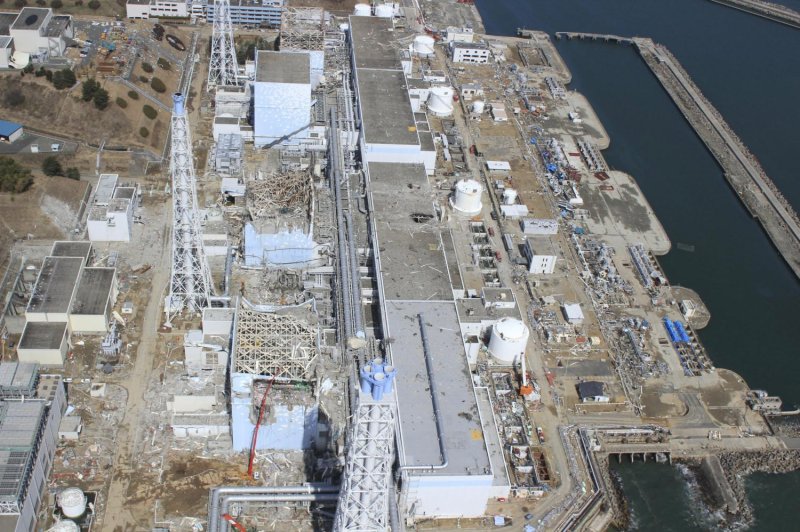PM Kishida calls for 'complete decommissioning' of Fukushima Daiichi nuclear plant

The crippled Fukushima Dai-ichi nuclear power plant of Unit 1 through Unit 4, from top to to bottom, is seen in Okumamachi, Fukushima prefecture, northern Japan in this March 20, 2011, photo taken by a small drone.
Groundwater in the area has continued to be contaminated since the tsunami as it comes in contact with damaged reactors and fuel debris and in April, former Prime Minister Yoshihide Suga decided to release tons of treated wastewater into the ocean despite strong pushback from conservation groups and concern from neighboring nations.
After inspecting the plant, Kishida offered flowers and prayed at a monument in the town of Namie, which at one point was entirely off-limits due to the nuclear crisis caused by the 2011 disaster.
Since taking power, Kishida has promoted the use of nuclear power, as most of the nation's plants remain offline after the tsunami.
He has pledged to restart nuclear power plants and meet safety standards through achieving local consent to help Japan reach its goal of attaining carbon neutrality by 2050.

The crippled Fukushima Dai-ichi nuclear power plant of Unit 1 through Unit 4, from top to to bottom, is seen in Okumamachi, Fukushima prefecture, northern Japan in this March 20, 2011, photo taken by a small drone.
File photo by UPI/Air Photo Service Co. Ltd. | License Photo
Oct. 17 (UPI) -- Japanese Prime Minister Fumio Kishida made his first visit Sunday to the defunct Fukushima Daiichi nuclear power plant in the prefecture, which was devastated by a tsunami a decade ago.
Kishida, who was sworn in as prime minister earlier this month, wants the plant the power plant, which experienced multiple meltdowns amid the national disasters, to be decommissioned.
"The power plant's complete decommissioning is a must if we want to rebuild the region, so I want to see you building a confidential relationship with the locals as you carry on with the work," he told the plant's operator.
Efforts to decommission the plant have been underway since 2011 when an earthquake-induced tsunami flooded hundreds of miles and severely damaged three nuclear reactors at the site, causing it to release massive quantities of radiation.
Oct. 17 (UPI) -- Japanese Prime Minister Fumio Kishida made his first visit Sunday to the defunct Fukushima Daiichi nuclear power plant in the prefecture, which was devastated by a tsunami a decade ago.
Kishida, who was sworn in as prime minister earlier this month, wants the plant the power plant, which experienced multiple meltdowns amid the national disasters, to be decommissioned.
"The power plant's complete decommissioning is a must if we want to rebuild the region, so I want to see you building a confidential relationship with the locals as you carry on with the work," he told the plant's operator.
Efforts to decommission the plant have been underway since 2011 when an earthquake-induced tsunami flooded hundreds of miles and severely damaged three nuclear reactors at the site, causing it to release massive quantities of radiation.
Groundwater in the area has continued to be contaminated since the tsunami as it comes in contact with damaged reactors and fuel debris and in April, former Prime Minister Yoshihide Suga decided to release tons of treated wastewater into the ocean despite strong pushback from conservation groups and concern from neighboring nations.
After inspecting the plant, Kishida offered flowers and prayed at a monument in the town of Namie, which at one point was entirely off-limits due to the nuclear crisis caused by the 2011 disaster.
Since taking power, Kishida has promoted the use of nuclear power, as most of the nation's plants remain offline after the tsunami.
He has pledged to restart nuclear power plants and meet safety standards through achieving local consent to help Japan reach its goal of attaining carbon neutrality by 2050.
No comments:
Post a Comment